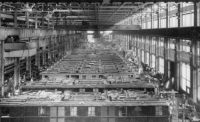The University of California-Berkeley has been center stage for new ideas, breakthroughs and radical changes for decades. Today, it’s leading the green manufacturing revolution. Cal Berkeley is home to the Laboratory for Manufacturing and Sustainability (LMAS).
“Sustainable manufacturing is the natural next step in the evolution of manufacturing philosophies,” says David Dornfeld, Ph.D., LMAS director and chairman of the Department of Mechanical Engineering. “We can trace the trend toward efficiency and waste to the concept of lean manufacturing that defined any expense that did not add value to the customer as ‘waste.’
“Six-sigma compliments lean manufacturing and seeks to improve quality by identifying and reducing errors in manufacturing processes,” adds Dornfeld. “These principles focus on efficiency of production, but not as much on materials, and even less on energy.”
Sustainable manufacturing quantifies production using a three-pronged approach: economic, environmental and social impact, claims Dornfeld, who has been following the concept for more than 20 years. In 1991, he visited a Daimler research laboratory in Germany where engineers were studying new ways to improve manufacturing efficiency while reducing environmental impact.
“After seeing what was being done in Europe and looking at the direction of energy prices and availability in California, it seemed to be a fruitful direction to start researching,” recalls Dornfeld, who says U.S. manufacturers’ perceptions of sustainability have changed in the past two decades.
While there’s a better awareness today, Dornfeld believes there’s still some misunderstanding in the manufacturing community. “There is confusion about ‘true sustainability’ and much of what you see being done is really greening the process or product,” notes Dornfeld. “But, that is the right direction, at least.”
To help educate and communicate with engineers about the opportunities, constraints and definitions of sustainable manufacturing, Dornfeld writes a blog on the topic (click http://green-manufacturing.blogspot.in). He also recently wrote a 298-page book entitledGreen Manufacturing: Fundamentals and Applications (Springer).
According to Dornfeld, manufacturers need to consider what environmental indicators they want to use to measure their impact. Some of the most common indicators include greenhouse gas emissions and water use.
“[Our] research at LMAS is concerned with the analysis and improvement of manufacturing processes and the development of tools to analyze sustainability,” says Dornfeld. “Specifically, research is focused on minimizing or removing contaminants and machining defects during manufacture; improving the precision and repeatability of advanced manufacturing technologies; and modeling sustainable, environmentally conscious manufacturing processes and systems.”
Research efforts are funded through the Sustainable Manufacturing Partnership. “All of our research is conducted with an eye to sustainability,” says Dornfeld. “We maintain a common goal of reducing waste in time, energy and materials.
“We are a full-service manufacturing sustainability organization,” Dornfeld points out. “Traditionally, we’ve focused on mechanical part production, which covers [automotive, aerospace, electronics and medical devices]. We’ve also worked a lot in semiconductor manufacturing and packaging.”
Dornfeld and his LMAS colleagues focus on analyzing and improving production processes, systems and enterprises, in addition to developing tools to analyze their sustainability. “Our research is focused on metrics and analytical tools for assessing the impact of processes, systems and enterprises,” he explains.
“[In addition, we model] sustainable, environmentally conscious manufacturing processes and systems,” says Dornfeld. “That includes green supply chains, manufacturing technology for reduced impact, and manufacturing technology for producing advanced energy sources or storage.”
At the moment, UC-Berkeley doesn’t offer a formal undergrad program dedicated to sustainable manufacturing. “However, there is a professional masters program focused on sustainable engineering that features a strong manufacturing component,” explains Dornfeld. “There is also a certificate program in engineering and business sustainability for grad students.”
The LMAS collaborates with other academic organizations on campus, including the Haas School of Business, the Blum Center for Developing Economies and the Berkeley Center for Green Chemistry.



